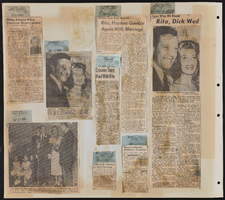Search the Special Collections and Archives Portal
Search Results
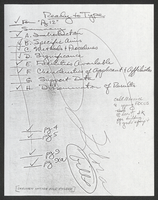
University of Nevada, Las Vegas law school establishment: correspondence
Date
Archival Collection
Description
Folder from the Flora Dungan Papers (MS-00193) -- Series 4. University of Nevada Regents Material.
Text
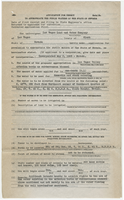
Application for permit to appropriate the public waters of the State of Nevada, November 1939
Date
Archival Collection
Description
Application for the Las Vegas Land and Water Company to appropriate the water from a new well on the Las Vegas Ranch. Original Collection: Union Pacific Railroad Collection 97-19
Text

Meeting minutes for Consolidated Student Senate University of Nevada, Las Vegas, March 16, 1989
Date
Archival Collection
Description
Text
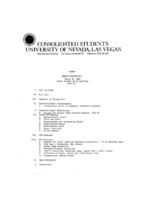
Meeting minutes for Consolidated Student Senate, University of Nevada, Las Vegas, March 25, 1980
Date
Archival Collection
Description
Text
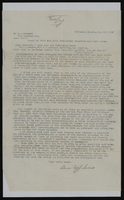
Correspondence, Levi Syphus to Sadie George
Date
Archival Collection
Description
Text
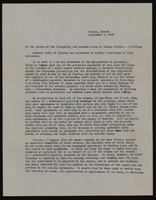
Correspondence, Levi Syphus to Sadie B. Clayton
Date
Archival Collection
Description
Text

Casiano Corpus Jr. oral history interview: transcript
Date
Archival Collection
Description
Oral history interview with Casiano Corpus Jr. conducted by Cecilia Winchell and Stefani Evans on February 14, 2023 for the Reflections: the Las Vegas Asian American and Pacific Islander Oral History Project. In this interview, Corpus Jr. details a difficult childhood in the Philippines, where society is highly socioeconomically stratified. He recalls his parents working a number of jobs to support their large family, and as soon as he finished his primary schooling, he also started working in construction. When his father was finally petitioned by his uncle to move to the United States, Corpus was at first reluctant to go, since he had a familiar life in the Philippines, but has come to love the United States and the life he created for himself. Immediately after moving to the United States, their family landed in Las Vegas, Nevada, and Corpus began working a number of jobs. He started out as a busboy at a Chinese restaurant before deciding that he wanted to work in a casino and moved to Union Plaza. His current job is as a porter at Palace Station, where he has been for the past 31 years. He has also been working to unionize Palace Station and Station casinos with the Culinary Union for the past twelve years. He talks about the hunger strike he organized, why he organizes with no fear, and what he hopes to see out of his efforts throughout the interview.
Text

Dr. Deborah Kuhls oral history interview: transcript
Date
Archival Collection
Description
Oral history interview with Dr. Deborah Kuhls conducted by Barbara Tabach on December 29, 2017 for the Remembering 1 October Oral History Project. In this interview, doctor Deborah A. Kuhls describes the preparation and procedures implemented at the University Medical Center of Southern Nevada (UMC) during the night of the October 1, 2017 mass shooting in Las Vegas, Nevada. She describes her experiences from that night and into the next morning, starting from when the trauma center first learned about the shooting to when patients began arriving. She goes into detail on the hospital's Military-Civilian Trauma System Partnership, which allowed for the installation of a second trauma area to treat the large volume of patients. In addition to the events at the hospital, Kuhls talks about the flurry of activities during the week of the shooting, including interviews with various media, the statewide meeting for surgeons, fellows, and residents where "stop the bleed" training was provided, and general meetings with various government officials, including Donald Trump. Deborah Kuhls also discusses the emotional impact of the shooting and its aftermath as well as her goals for the future of trauma in the medical field.
Text

